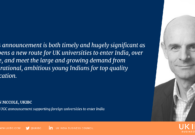India's young population needs the qualifications and skills to drive the economy deep into the 21st century. Over the next century India will have a surplus manpower of 4-5 crore (40-50 million) and there is a need to provide this youthful manpower with skills and ability to tackle global challenges.
There are exciting opportunities for UK-India collaboration to make a meaningful contribution through the introduction of global good practice, including in areas such as joint, dual and twinning degrees, online learning, TVET pathways, and international mobility and partnerships.
In July 2020, the Indian Government launched its new National Education Policy with emphasis on enhancing quality, equity, universal access, social inclusion, flexible degrees, teacher training, research and embedding technology in all aspects of education.
Thanks in large part to reinstatement of the UK's post-study work visa that enables Indian students to stay in the UK after university to look for work for two years, there has been significant growth in the number of Indian students coming to the UK in recent years. In 2020/2021, the UK welcomed 84,555 Indian students to the UK - the second most of any nationality.
In 2022, the UK and India agreed to the Mutual recognition of qualifications and allowing universities to award dual degrees, giving a real boost to collaborations and helping to attract more foreign students to study in the UK-India corridors. Mutual recognition and dual degrees will enable students to seamlessly transition between India and other countries, unleash new opportunities, and create wide ranging cross-border linkages that go well beyond the Higher Education sector.
As well as membership and consultancy services in the sector, the UKIBC's Launchpad service enables UK universities looking to enter the India market with a simple, de-risk and cost-effective way of having an expert presence in market before you can set-up your India entity. With more than 15 universities using our launchpad services already, we have helped UK universities to engage in partnerships with Indian universities and help to attract thousands of students to study in the UK.







